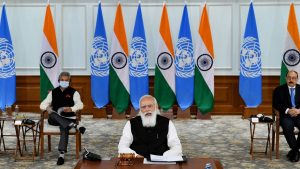UNSC Meet On Maritime Security:

The United Nations Security Council (UNSC) has adopted the first-ever presidential statement on maritime security.
- India, as the UNSC president for August 2021, noted the threats to maritime safety and security and called upon the members to consider implementing the 2000 UN Convention against Transnational Organized Crime.
- All the permanent members of UNSC (US, China, Russia, UK and France) attended the Meet.
Statement on Maritime Security:
- Emphasized on safeguarding the legitimate uses of the oceans and security of coastal communities, affirming that international law — reflected in the 1982 United Nations Convention on the Law of the Sea, among other global instruments — provides the legal framework for combating these illicit activities.
- Called on Member States to implement the International Ship and Port Facility Security Code and Chapter XI-2 of the International Convention for the Safety of Life at Sea, and to work with the International Maritime Organization (IMO) to promote safe and secure shipping while ensuring freedom of navigation.
- Member States, by other terms, should also consider ratifying, acceding to and implementing the 2000 United Nations Convention against Transnational Organized Crime and the Protocols thereto.
India’s Stand:
- India has put forth five basic basic principles for maritime security.
- Free maritime trade sans barriers so as to establish legitimate trade.
- In this context, SAGAR (‘Security and Growth for all in the Region’) vision can be highlighted.
- Settlement of maritime disputes should be peaceful and on the basis of international law only.
- It was with this understanding, and maturity, that India resolved its maritime boundary with its neighbour Bangladesh.
Responsible maritime connectivity should be encouraged. - Making reference to China’s Belt and Road Initiative, India held that, while creating structures for “maritime connectivity”, countries should keep “financial sustainability” and absorption capacity of the host countries.
- Need to collectively combat maritime threats posed by non-state actors and natural calamities.
- Highlighting India’s role in the Indian Ocean has been that of a net security provider.
- Preserve the maritime environment and maritime resources.
- Highlighting increasing pollution from plastic waste and oil spills




